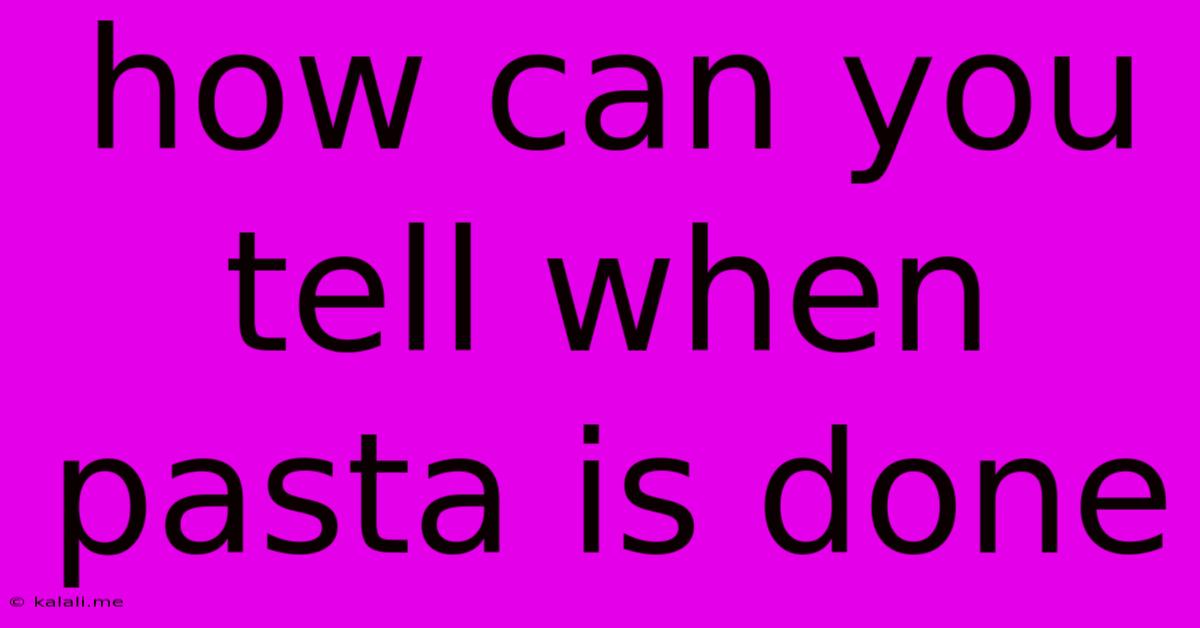How Can You Tell When Pasta Is Done
Kalali
May 30, 2025 · 3 min read

Table of Contents
How Can You Tell When Pasta is Done? A Guide to Perfectly Cooked Pasta
Knowing when your pasta is perfectly cooked is a crucial skill for any home cook. Overcooked pasta becomes mushy and unpleasant, while undercooked pasta is firm and unappetizing. This guide will help you master the art of perfectly cooked pasta every time, using a variety of methods to determine doneness. We'll explore the common pitfalls and offer solutions, ensuring your pasta dishes are always a success.
The Traditional "Al Dente" Test: Feeling for Perfection
The ideal pasta texture is al dente, an Italian term meaning "to the tooth." This means the pasta should offer a slight resistance when bitten, with a firm yet tender texture. Avoid the common mistake of overcooking; perfectly al dente pasta is slightly chewy, not soft or mushy.
To test for al dente, remove a piece of pasta from the pot using tongs (avoid draining the whole pot just yet!). Blow on it gently to cool it down slightly, then bite into it. If it's still slightly firm in the center, it's perfect. If it's completely soft and easily breaks apart, it's overcooked.
Tip: Different pasta shapes cook at slightly different rates. Check the package instructions for recommended cooking times, but always start checking for doneness a minute or two before the recommended time.
Time is of the Essence: Understanding Cooking Times
Pasta packages usually provide cooking time recommendations, but these are just guidelines. Cooking time is affected by factors like the type of pasta, the amount of water, and the altitude.
For instance, fresh pasta cooks much faster than dried pasta. Similarly, a larger volume of water will generally result in slightly faster cooking times. High altitude cooking requires slightly longer cooking times due to lower boiling temperatures.
Always start checking your pasta a minute or two before the suggested time to avoid overcooking. This prevents any unexpected mushiness.
The Visual Cue: Looking for Transparency
Along with the texture test, you can also use visual cues to determine pasta doneness. As the pasta cooks, it will gradually become more translucent. When the pasta is almost fully cooked, it will start to lose some of its opaque quality and become slightly clear. This is another indication that it's nearing the al dente stage.
Beyond the Pot: Considering the Sauce
The sauce you plan to use can also play a role in determining the pasta's doneness. If you're using a thick sauce, you might want to slightly undercook the pasta. The pasta will continue to cook slightly in the sauce. Conversely, if you're using a lighter sauce, it's perfectly fine to cook the pasta to a slightly more al dente consistency.
Common Mistakes and How to Avoid Them
- Overcrowding the pot: Too much pasta in the pot will lower the water temperature and lead to uneven cooking. Cook pasta in batches if necessary to ensure even cooking.
- Not salting the water enough: Properly salted water is crucial for flavorful pasta. The pasta absorbs the salt as it cooks, adding flavor throughout. Don't be shy with the salt!
- Rinsing the pasta: Avoid rinsing your pasta unless you're making a cold pasta salad. Rinsing washes away the starch, which helps the sauce cling to the pasta.
By mastering these techniques, you'll be well on your way to achieving perfectly cooked pasta every time, ensuring your pasta dishes are always delicious and satisfying. Remember, practice makes perfect, and soon you’ll be able to judge doneness effortlessly.
Latest Posts
Latest Posts
-
Why Does My Ac Unit Keep Freezing
Jun 01, 2025
-
Is It Safe To Eat Rare Steak
Jun 01, 2025
-
Did God Curse Adam And Eve
Jun 01, 2025
-
Peace Lily Plant Flowers Turn Brown
Jun 01, 2025
-
How Do I Know If An Outlet Is Grounded
Jun 01, 2025
Related Post
Thank you for visiting our website which covers about How Can You Tell When Pasta Is Done . We hope the information provided has been useful to you. Feel free to contact us if you have any questions or need further assistance. See you next time and don't miss to bookmark.